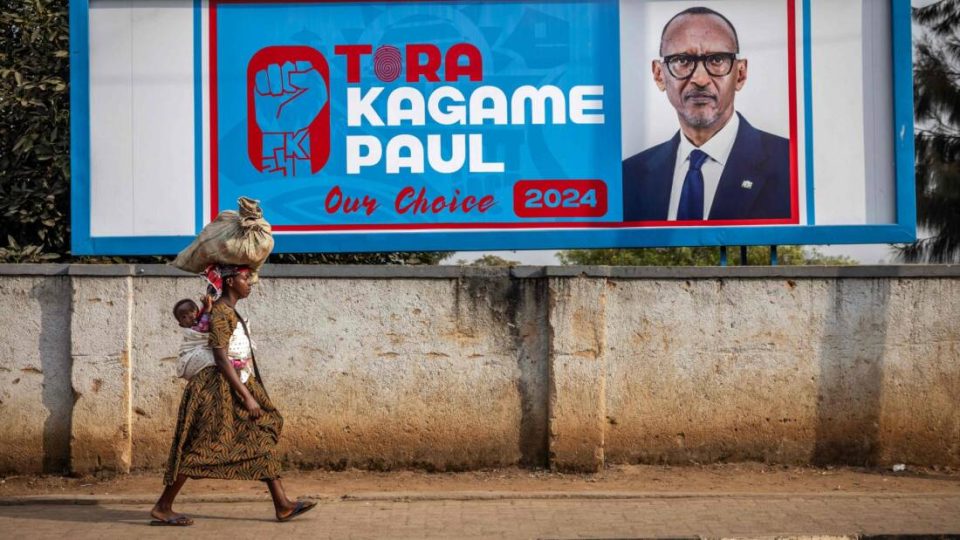In the last election, Paul Kagame, the long-time leader of Rwanda, received 98.8 percent of the vote.
Can you really be so popular that the entire population ticks off your name? In Rwanda, the answer is yes.
There is one man above all others. His name is Paul Kagame and ever since he headed the rebel force that stopped one of the worst genocides in world history back in 1994, his popularity has seemingly only grown and grown.
In today’s election, the question is therefore not whether he will win, but how big the victory will be.
The last election was in 2017, and here 98.8 percent of voters crossed off for the president. Regardless of whether that remarkable record is broken, there is good reason to ask more than one critical question about those kinds of election results.
Go straight to jail
Victoire Ingabire has only scorn left for the so-called democratic election.
– It’s not a choice. There is no opposition that is allowed to challenge, and the only thing we get an answer to is how big the president wins, she tells DR from Rwanda’s capital, Kigali, where she is under a form of house arrest.
She would have liked to run against the president, but has been refused. She has previously been punished for threatening the country’s security and supporting terrorism.
She was sentenced to 15 years in prison because she allowed herself to say that genocide was not only committed against the country’s Tutsis, but that it was also committed against Hutus, and that those guilty of it should also be punished in order to achieve reconciliation in the ordeal country.
That position is extremely controversial in Rwanda because it would mean that Paul Kagame and his army, who stopped the genocide, would also be investigated for any crimes. She spent eight years in prison before being pardoned by the president, but today cannot be allowed to travel out of Rwanda and therefore also not stand for election.
In her eyes, a purely political judgment to ensure that Kagame is not challenged.
Other possible candidates have also been prevented from running. To question the adopted policy is with life as an effort. This has been bitterly experienced by former political allies of Paul Kagame, journalists and political opponents.
– I do not understand why Europe and Rwanda’s partners, who are all democracies, support a regime that has not accepted human rights for 30 years and does not allow any kind of opposition. They make reports detailing the problems, but they do nothing about it. They make no demands on Rwanda to create more political freedom, and that disappoints me, she says to DR.
Dirty war in the neighboring country
Last week, a group of UN experts presented a report to the UN Security Council that concluded that Rwanda is not just providing support, but is actively involved with 3,000-4,000 soldiers in a dirty conflict in the neighboring Democratic Republic of Congo.
Here, a sea of armed groups are fighting each other and the Congolese army in one of the world’s most important areas when we talk about access to the minerals we use in our electrical appliances, among other things.
The largest group calls itself M23 and has just now surrounded the area’s largest city, Goma, forcing thousands to flee. At the same time, they now have control over one of the most important mining areas, and according to the UN, the arrow points unequivocally to Rwanda.
Danish darling
Despite Paul Kagame’s tough course towards his own countrymen and neighboring DR Congo, he has a formidable ability to secure alliances and friendships outside of Rwanda.
Denmark, for example, has become one of Rwanda’s close friends in recent years. The reason is quite simple: Rwanda has offered to help Denmark accept asylum seekers who come to Denmark.
Danish ministers made a pilgrimage to Rwanda to shake hands with the right ministers and include Rwanda in the aid funds that are distributed each year. There was no mistaking the excitement that Rwanda would help with a task of that nature.
However, Great Britain got ahead of Denmark and bought its way to an agreement with Rwanda. In the meantime, Denmark has got a new government and has decided to try to get an agreement under the auspices of the EU instead of going solo, but as recently as May, Immigration and Integration Minister Kaare Dybvad Bek repeated that the interest in Rwanda is not has disappeared.
On the other hand, it did so in Great Britain when a new government was formed last week. One of the first actions the new Prime Minister, Keir Starmer, took was to drop an expensive and possible deal.
But even though no asylum seekers came to Rwanda, Kagame’s government managed to get a lot of praise from both Great Britain and Denmark.



